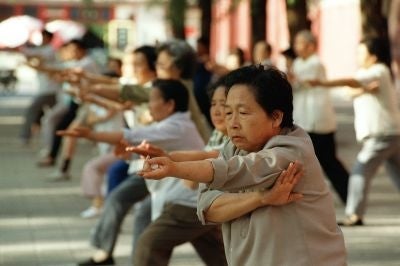Your support helps us to tell the story
This election is still a dead heat, according to most polls. In a fight with such wafer-thin margins, we need reporters on the ground talking to the people Trump and Harris are courting. Your support allows us to keep sending journalists to the story.
The Independent is trusted by 27 million Americans from across the entire political spectrum every month. Unlike many other quality news outlets, we choose not to lock you out of our reporting and analysis with paywalls. But quality journalism must still be paid for.
Help us keep bring these critical stories to light. Your support makes all the difference.
A review of medical studies gave the thumbs-up on Monday to tai chi as a way of preventing falls and improving mental health in the elderly, but does not confirm other claims made for the Chinese martial art.
British and South Korean researchers looked at 35 assessments of tai chi found in English-language, Chinese and Korean databases.
There was "convincingly positive" evidence that, among the elderly, practicising tai chi helped sense of balance and boosted psychological wellbeing.
However, the sport "seems to be ineffective" for treating the symptoms of cancer and rheumatoid arthritis, the authors said.
The evidence was contradictory as to whether tai chi improved high blood pressure, type 2 diabetes, cardiovascular disease, muscle strength, osteoporosis and other conditions.
Many studies were flawed because they had a poor design or were at high risk of bias. For instance, they enrolled only small numbers of volunteers or lacked an adequate "control" group to ensure a fair comparison.
The overview was conducted by Myeong Soo Lee of the Korea Institute of Oriental Medicine in Daejeon, and Edzard Ernst of the University of Exeter, southwestern England.
It appears in the British Journal of Sports Medicine, published by the British Medical Association (BMA).
Tai chi entails regular practice of deep breathing and relaxation techniques, combined with slow and gentle movements.
It is based on tenets in Confucian and Buddhist philosophies that there are two opposing life forces, yin and yang, which govern health.
Ill health results from an imbalance in these forces, but it can be corrected by tai chi, according to these beliefs.
ri/mh/mb

Join our commenting forum
Join thought-provoking conversations, follow other Independent readers and see their replies
Comments